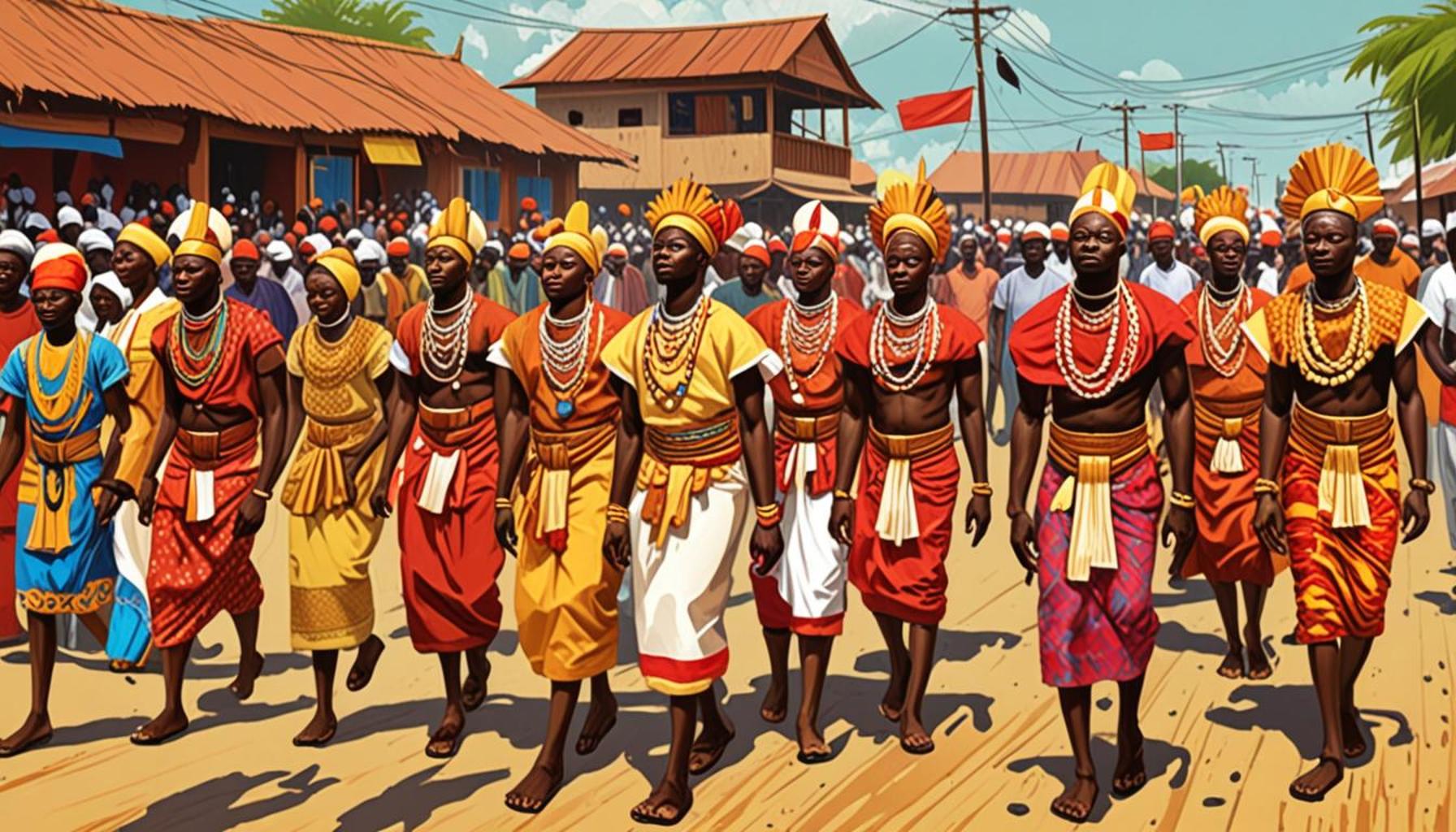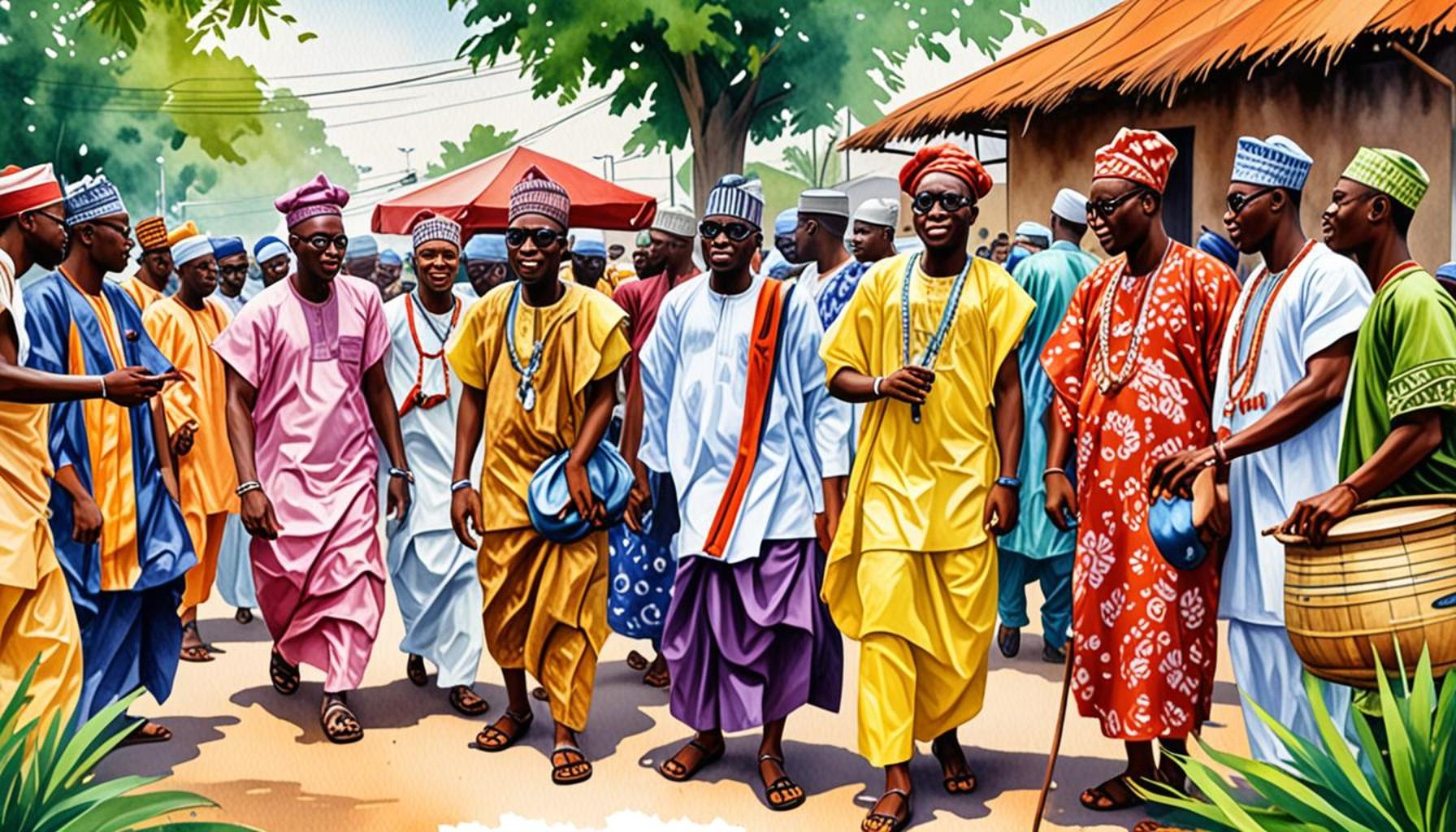The Influence of Traditional Fashion on Travel Clothing: Styles and Meanings

Exploring the Fusion of Tradition and Travel in Fashion
The world of fashion is constantly evolving, and in Nigeria, this evolution takes an intriguing turn with the convergence of traditional clothing and travel apparel. This unique blend not only enhances aesthetic appeal but also carries significant cultural implications, particularly in a country rich in history and diverse ethnicities.
At the heart of this phenomenon is the concept of cultural identity. African attire, such as the vibrant Ankara fabric or the elegant Aso Oke, serves as a visual representation of one’s heritage. When Nigerians travel, whether within the continent or beyond, they often wear these traditional garments, conveying a sense of belonging that transcends geographical boundaries. This meaningful choice fosters a connection to their roots, even when exploring unfamiliar locales.
Comfort and functionality are central to this fashion trend. Traditional garments are often crafted from breathable materials and designed for ease of movement. For instance, the flowing nature of the buba and iro ensemble allows for flexibility, making it ideal for busy travel itineraries that involve various activities. This practicality does not dull the aesthetic appeal; on the contrary, it enhances it. The intricate patterns and vibrant colors typical of Nigerian textiles are not just eye-catching—they invite conversations and admiration from fellow travelers and locals alike.
The importance of storytelling cannot be overlooked in this context. Each piece of traditional clothing often tells a unique tale about its wearer’s background and the cultural significance attached to it. For example, a Yoruba woman may wear a beautifully patterned gele (headwrap) that signifies her marital status or a fabric that symbolizes her family’s lineage. This use of clothing as a narrative tool enriches the travel experience, turning each outfit into a conversation starter.
Moreover, wearing traditional attire contributes to heritage preservation. In an era dominated by globalization and fast fashion, maintaining the relevance of indigenous styles is crucial. By choosing to wear these cultural garments while traveling, individuals actively participate in the preservation and celebration of their heritage, ensuring that these traditions are passed down through generations.
As travelers don their traditional clothing, they also become cultural ambassadors. They showcase the beauty and richness of Nigerian tradition to diverse audiences, often sparking interest in cultural exchanges. This global influence plays a vital role in fostering respect and understanding among different cultures, encouraging a dialogue that transcends borders.
In conclusion, the intersection of traditional fashion and travel clothing offers a fascinating exploration into how style, culture, and personal narrative intertwine. As we continue to navigate through this vibrant world, it becomes evident that each carefully chosen outfit is not merely fabric but a tapestry woven with stories, heritage, and cultural pride waiting to be shared. The journey through Nigerian traditional fashion is indeed an invitation for everyone to discover and appreciate the profound meanings behind every thread.
SEE ALSO: Click here to read another article
Cultural Significance and Modern Adaptation of Traditional Apparel
To delve deeper into the influence of traditional fashion on travel clothing, it is essential to understand how the rich tapestries of Nigerian culture are intricately woven into the very fabric of these garments. Each ethnic group boasts unique styles that not only accentuate their identity but also adapt seamlessly into the modern traveler’s wardrobe.
Traditional attire, such as the Isiagu, often worn by the Igbo, is characterized by its regal prints and vibrant colors. Similarly, the Fula attire, often donned by the Fulani, features striking embroidery and intricate beadwork. These outfits are not merely decorative; they encapsulate the essence of community values, ancestral stories, and personal identity. As Nigerians embark on travels, choosing to wear these garments becomes an act of cultural homage, celebrating heritage amid the diverse landscapes they explore.
In recent years, there has been a noticeable trend where designers are reinterpreting traditional fashion to suit modern sensibilities. This adaptation has resulted in the emergence of hybrid styles that marry traditional aesthetics with contemporary functionality. Many travelers can be seen in outfits that blend Ankara prints with modern cuts, allowing for easy wear and movement while maintaining a strong connection to their roots.
Traveling in traditional attire also comes with its unique set of advantages, especially in terms of cultural exchange and connection with locals. When wearing traditional clothing, travelers often find themselves engaging with individuals who share cultural heritage, establishing immediate rapport through shared customs. This phenomenon creates an enriching experience where stories and ideas can be exchanged, fostering a sense of community even miles away from home.
A few key advantages of incorporating traditional fashion into travel clothing include:
- Enhanced Comfort: Traditional garments like the flowing buba and iro offer breathability and ease of movement, crucial for active travel.
- Unique Expression: Wearing traditional attire sets travelers apart, distinguishing them in a global landscape saturated with Western fashion influences.
- Cultural Representation: By wearing traditional garments, travelers act as ambassadors of their culture, promoting appreciation for Nigeria’s rich heritage.
- Storytelling: Traditional clothing allows for personal narratives that convey individual and communal identities, enriching travel experiences through shared history.
The culture of dressing while traveling is, therefore, not just about aesthetics; it is a powerful expression of identity and belonging. It allows Nigerians to, quite literally, carry their culture with them, breaking barriers and building connections in a world that is rapidly becoming more interconnected. As travelers embrace this blend of tradition and modernity, they not only enhance their travel wardrobes but also breathe life into the stories embedded within their traditional fashion.
| Category | Description |
|---|---|
| Cultural Expression | Traditional attire is often used to reflect cultural identities and heritage. |
| Authenticity in Travel | Wearing traditional clothing enhances the travel experience, allowing deeper connections with local cultures. |
| Sustainability | Traditional fashion promotes eco-friendly practices, including local sourcing and craftsmanship. |
| Unique Fashion Statements | Traveling in traditional styles allows individuals to stand out while respecting local customs. |
Traditional fashion significantly impacts travel clothing, as it intersects with personal and communal identity. Through cultural expression, individuals craft their travel narratives, embracing vibrant textiles and unique designs that resonate with local customs. When travelers don traditional garments, they engage in an authentic cultural exchange, fostering connections with the destinations they explore. Not only does this approach enrich the travel experience, it emphasizes the importance of sustainability, with many traditional outfits showcasing indigenous craftsmanship and sustainable materials. Furthermore, sporting traditional attire allows travelers to make unique fashion statements that honor cultural significance while offering a refreshing alternative to mainstream travel clothing. Embracing this fusion of style and meaning, individuals deepen their understanding of world cultures and enhance their travel journey through the lens of fashion. By integrating traditional fashion into travel wear, we open up dialogues about heritage, artistry, and conscientious consumption, enriching not just our wardrobes but our experiences as well.
SEE ALSO: Click here to read another article
Blending Aesthetics with Functionality: The Rise of Travel-Ready Traditional Wear
As a response to the evolving landscape of travel, traditional fashion is not only celebrating its roots but also adapting to meet the practical needs of modern-day explorers. The rise of travel-ready traditional wear is an exciting development that brings both style and functionality to the forefront of the travel clothing conversation. This evolution raises important questions about how traditional attire can be designed to suit various travel situations while maintaining an authentic cultural essence.
Innovative Nigerian designers have begun incorporating lightweight, wrinkle-resistant fabrics and breathable textures into their traditional styles. For example, the incorporation of materials like cotton blends and chiffon into traditional garments such as the Agbada allows travelers to glide comfortably through bustling city streets or quiet rural areas without sacrificing their cultural identity. This not only enhances wearability but also redefines the perception of traditional clothing as purely ceremonial attire.
An emerging trend among Nigerian travelers is the adoption of modular designs, where pieces can be mixed and matched for various occasions. The traditional wrapper can transform from a formal outfit at a wedding in Lagos to a chic and casual ensemble for sightseeing in Abuja. This versatility resonates particularly with the contemporary traveler who values adaptability without compromising on style. As more individuals seek outfits that serve multiple purposes, we see a direct influence of traditional fashion on modern travel apparel.
The global appreciation for traditional fabrics and patterns is on the rise, with a growing number of international fashion houses incorporating elements of Nigerian textiles into their collections. The vibrant Ankara prints have gained a special place in fashion shows across the globe, leading to an increase in demand for unique pieces that reflect cultural richness. This trend opens avenues for local artisans to gain international recognition while inspiring travelers to wear their culture with pride, potentially sparking conversations about the significance of their rich heritage.
- Durability: Traditional clothing is known for its lasting quality. Using traditional techniques, garments can withstand the rigors of travel, making them a practical choice for frequent travelers.
- Ease of Care: Many modern adaptations of traditional outfits are designed to be low-maintenance, allowing for easy washing and quick drying—essential features for the on-the-go traveler.
- Affordability: Emerging local brands are making traditional designs more accessible, offering budget-friendly options for travelers looking to incorporate cultural attire into their wardrobes.
- Personalization: The customization of traditional garments enables travelers to express their unique styles, helping them stand out in a world of mass-produced fashion.
As traditional clothing becomes increasingly integrated into travel wardrobes, it presents a unique opportunity for cultural exploration and appreciation. Nigerians traveling abroad can share their heritage through the garments they wear, ultimately leading to a deeper understanding of traditions, mutual respect, and cultural exchange. By embracing the fashion-forward interpretation of traditional attire, travelers not only enjoy practical benefits but also enrich their journeys with meaningful connections to their identity and culture. This symbiotic relationship between tradition and travel clothing invites further exploration into how we perceive and utilize our rich cultural past in today’s evolving world.
YOU MAY ALSO LIKE: Read read another article
Embracing Culture Through Travel Apparel
In an increasingly interconnected world, the intersection of traditional fashion and travel clothing serves as a powerful narrative of identity and cultural pride. As we have explored, traditional attire is no longer confined to ceremonial occasions but is evolving into versatile, travel-ready clothing that meets the demands of contemporary explorers. This fusion enriches personal experiences as travelers move beyond mere sightseeing to become ambassadors of their heritage.
The innovative approaches by Nigerian designers, incorporating breathable fabrics and modular designs, highlight how traditional fashion can be adapted to enhance both style and functionality. The ability to transition from formal to casual attire while retaining cultural significance reflects a profound respect for one’s roots, showcasing how traditional garments can narrate stories and foster connections across borders.
Moreover, the global recognition and appreciation for Nigerian textiles offer local artisans new opportunities to shine on the international stage. As travelers don these unique pieces, they not only celebrate their culture but also invite engagement and dialogue about their rich heritage. This cultural exchange can forge deeper mutual understanding, challenging stereotypes and misconceptions that often accompany travel.
Ultimately, as more travelers embrace traditional fashion, they are highlighting the importance of sustainability and cultural respect in an age of mass production. The journey forward lies in celebrating the beautiful tapestry of our past while innovating for the future, ensuring that the language of style continues to speak volumes about who we are and where we come from. In this dance of tradition and modernity, we find the essence of travel—not just destination, but the meaningful experiences woven into every piece of clothing we choose to wear.


